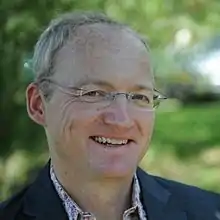Toby Walsh
Toby Walsh FAA FACM FAAAS FAAAI FEurAI is a Laureate fellow, and professor of artificial intelligence in the UNSW School of Computer Science and Engineering[1] at the University of New South Wales[2] and Data61 (formerly NICTA[3]). He has served as Scientific Director of NICTA, Australia's centre of excellence for ICT research. He is noted for his work in artificial intelligence, especially in the areas of social choice, constraint programming and propositional satisfiability. He currently serves on the Executive Council on the Association for the Advancement of Artificial Intelligence.[4]
Toby Walsh | |
|---|---|
 | |
| Born | 1964 |
| Nationality | British |
| Alma mater | University of Edinburgh, University of Cambridge |
| Scientific career | |
| Fields | Artificial Intelligence, Automated reasoning |
| Institutions | University of New South Wales and Data61, (formerly NICTA) |
| Doctoral advisor | Alan Bundy |
He received an M.A. degree in theoretical physics and mathematics from the University of Cambridge and a M.Sc. and Ph.D. degree in artificial intelligence from the University of Edinburgh. He has held research positions in Australia, England, Ireland, Italy France, Germany, Scotland, and Sweden. He has been Editor-in-Chief[5] of the Journal of Artificial Intelligence Research, and of AI Communications. He was chaired several conferences in the area of artificial intelligence including the International Joint Conference on Artificial Intelligence.[6] He is Editor of the Handbook of Constraint Programming,[7] and of the Handbook of Satisfiability.[8]
In 2015, he helped release an open letter[9] calling for a ban on offensive autonomous weapons that attracted over 20,000 signatures. He later gave a talk at TEDxBerlin on this topic.[10] In 2017, he organized an open letter calling for a ban signed by over 100 founders of AI and Robotics companies including Elon Musk, Mustafa Suleyman and Jüergen Schmidhuber. Also in 2017, he organized a letter[11] to the Prime Minister of Australia calling for Australia to negotiate towards a ban signed by over one hundred researchers from Australia working on artificial intelligence.
In 2018, he chaired the Expert Working Group of the Australian Council of Learned Academies (ACOLA) preparing a Horizon Scanning Report on the "Deployment of Artificial Intelligence and what it presents for Australia" at the request of Australia’s Chief Scientist, Dr Alan Finkel, and on behalf of the Commonwealth Science Council. Additionally, he was interviewed on ABC Comedy by Tom Ballard, discussing the "robot revolution".[12]
He is the author of two books on artificial intelligence for a general audience: "It's Alive!: Artificial Intelligence from the Logic Piano to Killer Robots"[13] which looks at the history and present of AI, and "2062: The World that AI Made"[14] which looks at the potential impact AI will have on our society. Both are published by Black Inc. The books are available in ten different languages: Chinese, English, German, Korean, Polish, Romanian, Russian, Taiwanese, Turkish and Vietnamese.
Honors and awards
In 2020, he was elected a Fellow of the ACM and a Fellow of the American Association for the Advancement of Science.
In 2018, he was runner up in the Arms Control Association's annual Person/s of the Year Award.[15]
In 2016, he was elected a Fellow of the Australian Academy of Science,[16] won the NSW Premier's Prize for Excellence in Engineering and ICT,[17] and was made Scientia Professor at UNSW.[18]
In 2015, the Association for Constraint Programming presented him with their Research Excellence Award[19] which identifies and honours the most influential people in the field.
In 2014, he won a Humboldt Prize.[20]
In 2008, he was elected a Fellow of the Association for the Advancement of Artificial Intelligence [21] for "significant and sustained contributions to automated deduction and constraint programming, and for extraordinary service to the AI community".
In 2003, he was elected a Fellow of the European Association for Artificial Intelligence [22] in recognition of "significant, sustained contributions to the field of artificial intelligence".
References
- "CSE UNSW Webpage". University of New South Wales.
- "UNSW webpage". University of New South Wales.
- "NICTA personal webpage". NICTA.
- "AAAI Officials". Association for the Advancement of Artificial Intelligence.
- "Masthead". Journal of Artificial Intelligence Research.
- "Opening Ceremony". VideoLectures.net.
- "Handbook of Constraint Programming". Elsevier.
- "Handbook of Satisfiability". IOS Press.
- "Open letter hosted by Future of Life Institute".
- "Video from TEDxBerlin".
- Sample, Ian (6 November 2017). "Ban killer robots, experts urge Australian and Canadian leaders". the Guardian. Retrieved 18 September 2018.
- "An interview with Toby Walsh on the robot revolution". YouTube.
- It's Alive! by Toby Walsh. 6 July 2016.
- 2062 by Toby Walsh. 4 March 2018.
- "UNSW's Toby Walsh voted as runner-up for global award". UNSW Newsroom. 10 January 2018. Retrieved 18 September 2018.
- "Australian Academy of Science announces 2016 Fellows".
- "2016 Category Prize Winners - NSW Chief Scientist & Engineer". www.chiefscientist.nsw.gov.au. Retrieved 18 September 2018.
- "UNSW appoints 16 new Scientia Professors". UNSW Newsroom. 16 December 2016. Retrieved 18 September 2018.
- "Research Excellence Award | Association for Constraint Programming". www.a4cp.org. Retrieved 18 September 2018.
- "Announcement at NICTA's Optimisation Research Group website".
- "AAAI Fellow". AAAI.
- "ECCAI Fellow". Archived from the original on 23 January 2011.